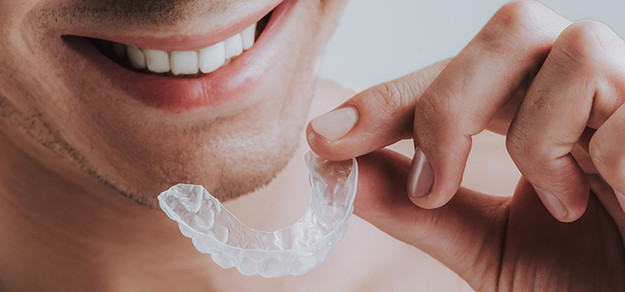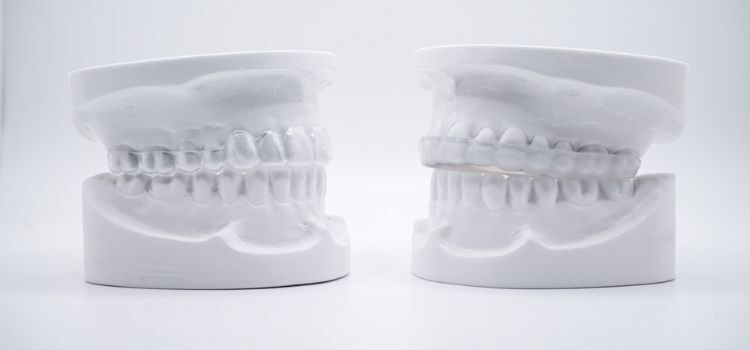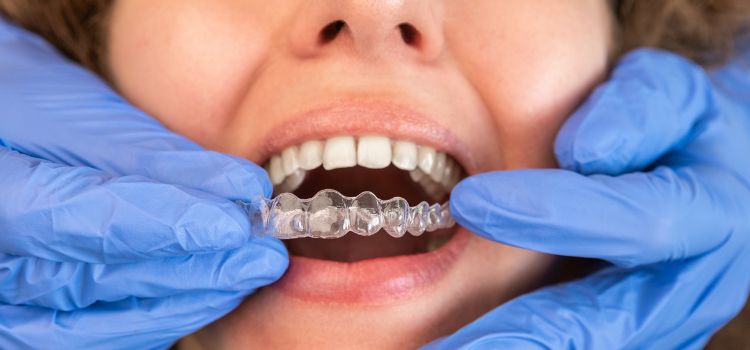Retainer vs Night Guard for Teeth Grinding
4th Apr 2025

If you grind your teeth at night, you might be wondering—can I just wear my retainer instead of getting a night guard? After all, they both fit over your teeth, right?
While retainers and night guards may look similar, they serve very different purposes. Choosing the right one can make a big difference in protecting your teeth and avoiding future dental problems.
In this post, we’ll break down the key differences between retainers and night guards, explain when each one is needed, and help you figure out which option is best for you.
Retainer vs Night Guard: Key Differences

At first glance, retainers and night guards may seem similar—they both fit over your teeth and are made from plastic materials. But they’re designed for completely different purposes. Here’s a simple comparison to help you understand the key differences:
Primary Purpose
Retainer: Keeps your teeth in place after orthodontic treatment.
Night Guard: Protects your teeth from grinding or clenching (bruxism).
Material
Retainer: Usually made of thin plastic or acrylic, sometimes with metal wires.
Night Guard: Made of thicker materials like soft plastic, dual laminate, or hard acrylic for added protection.
Thickness
Retainer: Thin and lightweight to hold tooth alignment.
Night Guard: Thicker to absorb pressure and prevent wear from grinding.
Durability for Bruxism
Retainer: Not built to withstand grinding—can crack, wear down, or damage teeth.
Night Guard: Specifically designed to handle the forces of grinding and clenching.
Fit
Retainer: Snug fit to maintain tooth position.
Night Guard: Custom-fit for comfort, cushioning, and protection.
Best For
Retainer: People who have recently finished braces or Invisalign.
Night Guard: Individuals who grind or clench their teeth, especially at night.
Bottom line: A retainer is not built to protect your teeth from the pressure of grinding. Using one for that purpose could damage the retainer—and your teeth. A night guard, on the other hand, is made specifically to handle that pressure and protect your smile.
Can I Wear a Retainer as a Night Guard?
It’s a common question—and the short answer is no, you shouldn’t use a retainer as a night guard.
While a retainer may look similar to a night guard, it’s not made to handle the pressure from grinding or clenching. Retainers are thin and designed to keep your teeth in position, not to absorb force. If you grind your teeth while wearing a retainer, a few things can happen:
- The retainer can crack or break.
- It may not protect your teeth, leaving them exposed to wear and damage.
- You could end up with jaw pain or increased tooth sensitivity.
- It might even cause your teeth to shift if the retainer becomes warped or damaged.
If you suspect you grind your teeth at night, it’s important to use a night guard that’s specially designed for bruxism. It offers the right level of protection and comfort, without risking damage to your dental appliances or teeth.
Related Article:
What Is a Night Guard and When Do You Need One?

A night guard is a dental appliance designed to protect your teeth from grinding or clenching—a condition known as bruxism. Unlike retainers, night guards are made to absorb pressure and impact, helping to prevent damage while you sleep.
There are several types of night guards depending on the severity of your grinding:
- Soft night guards – flexible and comfortable, ideal for mild grinding
- Dual laminate night guards – soft inside, hard outside, great for moderate grinding
- Hard night guards – made from strong acrylic, best for heavy grinders or long-term use
Night guards are typically thicker and more durable than retainers. They act as a cushion between your upper and lower teeth, helping to reduce wear, ease jaw tension, and relieve symptoms like headaches and facial soreness.
You may need a night guard if you experience:
- Morning headaches or jaw pain
- Tooth sensitivity or worn-down teeth
- Clicking or popping in your jaw
- Chipped teeth or damage to dental work
- Facial tension, neck pain, or trouble sleeping
Many people don’t realize they grind their teeth until symptoms appear—or until a dentist spots the signs during a checkup. Left untreated, bruxism can cause serious damage to your teeth and jaw over time.
Important: If you’re noticing any of these symptoms, a custom night guard is one of the best ways to protect your teeth and get relief.
Related Article:
- Do I Really Need a Night Guard?
- Wearing a Night Guard: Pros and Cons
- How Long Does it Take for a Night Guard to Work?
What Is a Retainer and When Do You Need One?

A retainer is a dental appliance used to keep your teeth in place after orthodontic treatment, such as braces or clear aligners. Its main job is to maintain your new tooth alignment and prevent your teeth from shifting back to their original positions.
There are a few types of retainers:
- Clear plastic retainers – thin, transparent, and molded to fit your teeth
- Hawley retainers – made of acrylic and metal wire, often removable
- Fixed retainers – a thin wire bonded behind your teeth, usually the lower front ones
You’ll typically start wearing a retainer right after finishing orthodontic treatment. Over time, your dentist may recommend wearing it less frequently, but some people continue using theirs occasionally for years to keep their smile in place.
You may need a retainer if you:
- Just finished braces or Invisalign
- Want to maintain your current tooth alignment
Had minor dental adjustments - Were advised by your dentist or orthodontist to wear one regularly
Important Note: If you also grind your teeth at night, let your dentist know. You might need a special type of night guard with retention features, or alternate between a retainer and a night guard depending on your needs.
How Long Do I Need to Wear a Retainer or Night Guard?
For retainers, the timeline depends on how recently you’ve finished orthodontic treatment. After your braces or aligners come off, you’ll need to wear your retainer regularly until the bones and tissues around your teeth stabilize. If you stop too soon, your teeth could shift back—undoing all your progress.
If it’s been over a year since your braces were removed, your orthodontist may tell you it’s safe to wear your retainer less often or stop altogether. Some people continue wearing their retainer occasionally—just to make sure their teeth stay in place.
If you're currently wearing a retainer but are also dealing with teeth grinding, talk to your dentist.
For night guards, you’ll need to keep wearing one as long as you have bruxism. In most cases, that means wearing it long-term—even for life—to protect your teeth from damage.
If your grinding is linked to stress, you can try natural solutions like:
- Stress management techniques
- Deep breathing exercises
- Yoga or meditation
- Improved sleep habits
However, don’t stop wearing your night guard unless your dentist confirms that it’s safe to do so. Even if symptoms improve, it's best to be cautious and continue protecting your teeth until you're sure the grinding has stopped.
FAQ’s: Retainer vs Night Guard for Teeth Grinding
1. Can I wear both a night guard and retainer?
In most cases, you can’t wear both at the same time because they both fit over your teeth. However, some custom night guards can be made with retainer-like features. If you need both, talk to your dentist—they may recommend alternating use or creating a dual-purpose appliance.
2. Will insurance cover a night guard?
Some dental insurance plans may partially cover the cost of a night guard, especially if it’s prescribed for bruxism. Coverage varies, so it’s best to check with your provider and ask your dentist for a detailed invoice or insurance code.
3. Can I use an over-the-counter night guard instead of a custom one?
Store-bought night guards can offer temporary relief, but they often don’t fit well and may be bulky or uncomfortable. A custom night guard provides better protection, comfort, and durability.
4. Can I wear a night guard as a retainer?
Whether custom-fit or over-the-counter, most night guards do not fit snugly enough to double as a retainer. However, you typically only wear a night guard on your upper teeth or bottom teeth. So if you need a retainer on your top and bottom teeth, you may still need a retainer for the teeth that don’t have a night guard.
Conclusion
While retainers and night guards might look alike, they serve very different purposes. Retainers are designed to keep your teeth in place after orthodontic treatment, while night guards are made to protect your teeth from the pressure of grinding and clenching.
Wearing the wrong one can lead to more damage, discomfort, or wasted money—so it’s important to choose the right appliance for your needs. If you’re grinding your teeth at night, a custom night guard is the safest and most effective solution.
Pro Teeth Guard makes it easy to get a high-quality, custom night guard without the high price tag from the dentist’s office. Order your custom night guard today and take the first step toward a healthier, more comfortable smile.

- Most Popular
- Hard Outside, Soft Inside
- 2MM Thick
- Moderate / Heavy

- Most Durable
- Hard Materials
- 1.5MM Thick
- Heavy / Severe

- For Day Time Use
- Thin, Barely Visible
- 1MM Thick
- Light / Moderate

- For Clenching
- Flexible & Soft
- 1.5MM Thick
- Light / Moderate
